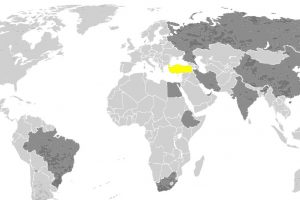The date Feb. 21 marks a significant milestone for the Turkish defense industry as Türkiye’s domestically produced fifth-generation KAAN stealth fighter jet made its historic first test flight after a two-month delay. The brand-new jet flew for 13 minutes at an altitude of 8,000 feet and a speed of 230 knots, passing the first and most important test successfully. The testing phase for KAAN will persist until mass production, scheduled to commence in 2028.
Turkish people were quite proud of seeing the jet in the sky as it was indigenous, showing the level Türkiye’s engineering capacity and capabilities had reached. Indeed, having a flying fifth-generation fighter is perhaps the most difficult achievement for a country. It is rightfully acknowledged that a country capable of producing a fighter jet can manufacture various other weapons. Hence, the Turkish people have earned the right to celebrate this success.
However, not everyone shares the same level of optimism as the Turkish people. Some analysts express concerns, specifically highlighting the engine problem, which is considered the fundamental component of an aircraft and perhaps more crucial than the entire product. Indeed, a flying warcraft, whether a fighter or a missile, essentially relies on its engine. While other components can be produced over time, manufacturing a reliable engine may pose challenges, even with ample funding and decades of effort, as history has shown with numerous failures in engine production.
Given that Türkiye’s Turkish Aerospace Industries (TAI or TUSAŞ), the producer company, powers KAAN with twin F110 engines produced by American company General Electric, that tensions between the U.S. and Türkiye may not decrease soon, and that helping Türkiye to produce a fighter that may disrupt America’s foreign policy and jet sales, particularly in the Middle East, the Washington administration may not greenlight the sale of F110s to TUSAŞ. Setting aside Washington’s reluctance, even Jewish, Greek and Armenian lobby groups have the potential to halt the export of engines to be assembled to KAAN.
Türkiye’s unyielding pursuit
Yet, Türkiye’s relentless efforts to indigenously produce other weapons such as missiles, helicopters, and unmanned combat aerial vehicles (UCAVs) show that they will not step back and throw the KAAN project into the trash can. When the U.S. did not sell Patriots, Ankara did not only buy Russia-made S-400 missiles but also started to produce its own equivalents whose latest version, namely Siper-2, can hit the target from an impressive range, surpassing 150 kilometers (90 miles).
Furthermore, Türkiye’s becoming a global drone producer started after it incurred embargoes on the sale of UAVs. Another example is that Türkiye’s first domestic tank Altay was supposed to be powered by a Germany-made engine until the Germans decided not to sell it. Türkiye then started to produce its own engine, and nowadays the engine is being tested on a tank. Therefore, embargoes can only decelerate a weapons project but cannot cause it to be abandoned. If the U.S. does not sell jet engines, this will be the case for KAAN as well.

Moreover, the lack of advanced fighters will become an existential threat for Türkiye since the country is circled by ongoing wars, ambitious regional powers, and a neighbor, namely Greece, irresponsibly and unnecessarily arming itself. Türkiye cannot give air superiority to its neighbors, particularly to those that are relatively smaller. This being the fact, the Turkish government will not hesitate to supply the required funds to maintain the project.
Finally, not Türkiye, the producer, but KAAN’s customers may strive more for the survival of the project. Arab states, the Turkic world, and many states from the Global South will probably purchase the jet as Türkiye will not put forward conditions for its sale. Plus, the majority of mentioned states are Türkiye’s friends and they are already waiting for an alternative jet other than American or European. Therefore, potential customers will push the Turkish state to finish the project in order to obtain advanced jets. Meanwhile, Azerbaijan and Pakistan have already partly joined the project. Since the maiden flight has crystallized the project, more countries may opt for partnering with Türkiye to produce KAAN. Hence, besides customers, KAAN will most probably lure countries for partnerships as well.
Overall, KAAN was born due to the security necessities of Türkiye and its friendly countries, and it will survive as there is no other choice other than its production.
Source: Daily Sabah






